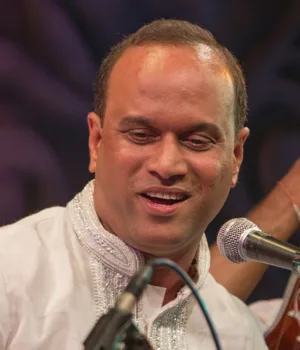by Sanatkumar Phadte
Noted Goan classical singer, Dr. Pravin Gaonkar has been a pioneer behind the iconic Swarmangesh music festival in Goa. His enterprise also saw the formation of ‘Swastik’, a cultural organisation that helps in staging the programmes of renowned singers and artists in the state. Having accomplished great heights, he is now keen to pass on the knowledge of classical music to the new generation with his music school ‘Sanjeevan Music Academy’ playing a big role in imparting musical education to people of all ages.
Goa’s exclusive positive news startup
www.Livenewsgoa.com, caught up with Dr. Pravin Gaonkar and here are the excerpts from the interview.
Q&A
LNG: How would you describe your illustrious journey in the field of music?
PG: Being born in Canacona to an officer in the accounts field from a government department, I was introduced to various types of music as my father was very much fond of bhajans, natya-sangeet and Indian classical music. So I could see him acting in sangeet natak or musical plays and I could hear music in our house since childhood. When joined as a professor in college in 1993, I was learning music myself. I happened to listen to Pandit Ajay Chakravarty in Samraat Sangeet Sammelan in 1989, and I decided to learn music. I took admission in Kala Academy and I met a finest teacher in the form of Kamlakar Naik. As I continued my job as a professor in Dempo college, my education in music also continued. In 2018, I decided to leave my job taking a voluntary retirement and devote full time for music. My decision met with a lot of protests both in the family and in my inner circle. In 2019, I started Sanjeevan Music Academy. In 2008, I had started Swastik, a cultural organisation in Panaji, which was a pioneer body in bringing many a renowned singers and artists in Goa through its platform by organising special programmes especially on Gudi Padwa, every year. In 2011, we started Swarmangesh, a classical music festival in the name of Master Dinanath Mangeshkar, noted music maestro and classical singer. The 12th edition of this festival recently happened in December 2023. Bharat Ratna awardee and legendary singer late Lata Mangeshkar inaugurated the first Swarmangesh concert in 2011. Today in Sanjeevan academy, we have 13 faculty and 190 students.
LNG: How do you assess the response your musical events gained in this journey?
PG: My music programmes have been in full swing over the years along with some songs that I composed for various albums and music projects. In 2012, I released “Bhakti”, my first album with devotional songs in Marathi. A group from Karwar, known as Gurumath, released three albums which had songs sang and composed by me. With the advent of digital technology and internet, slowly the culture of audio CDs faded away, I have started uploading my latest work on You Tube and other digital platforms. Today, I have been focussing more on classical music or ‘shastriya sangeet’. Of course, I am doing shows on Bhavgeet (emotional songs) and Bhaktigeet (devotional songs) but me and my students focus more on classical music. We do musical programmes in various states like Delhi, Maharashtra, Madhya Pradesh and Rajasthan. I did a programme called Swarbhakti yatra, through which I travelled in South India, especially in Karnataka, along with my students and we visited various places in coastel belt of Goa and Karnataka. We visited temples in places like Partagali math, Karwar, Kumtha, Kundapur, Udupi, Bantwa, Dharmasthal, Karkal and other various places and performed in our musical programmes. To promote our academy, we have done programmes in Belgaum, Kolhapur, Sawantwadi, Kudal, Vengurla and also did a programme in Mumbai recently. There is also the intention that my students should get a platform through this initiative. We also organise a programme called “Pratidhvani”, in memory of our student late Francis Rodrigues, who would sing classical songs and try to financially help his mother, every year.
LNG: How challenging is it to run a music school in Goa?
PG : It’s quite difficult and challenging actually to run a music school, especially private and in Goa as one doesn’t get any support in Goa to do so. I have taken this task on my shoulders and many a times spend money from my own pocket to bear the expenses. Classical music also has a spiritual aspect but I cannot focus on it at present as my focus is only on building good students in classical music. Goa has a rich heritage and culture as well as history of classical music. Classical music should be passed on to today’s younger generation. That is my priority. Management of academy is difficult as we don’t get any aid from the government easily. We have to rely entirely on the fees paid by the students. The costs of running an academy is too high. We are also trying for revival of Sarangi in Goa. There were many Sarangi players in Goa, once upon a time. But today, we don’t have anyone. We have brought some Sarangi instruments in the academy and hired a sarangi instructor from Gwalior specially to train new students in the instrument. We are bearing the cost of his stay and house rent through the academy. We are planning to produce at least two professional sarangi players in the next five years.
LNG: What according to you should be done to revive classical music among young generation in this era of pop and rock music?
PG: Yes, rock and pop music is very prominent in colleges. We are trying to promote classical music in schools and also invite artists from various parts of the country to perform here (Goa). Many new kids are learning classical music. We are getting good response from children as well as parents. You don’t get quick fame in classical music. It requires a lot of practice, sacrifices and dedication. Only then, you can see some success. You don’t get instant publicity in classical music. That also drives away many youth from taking classical music. But we get good quality students from younger generation!





